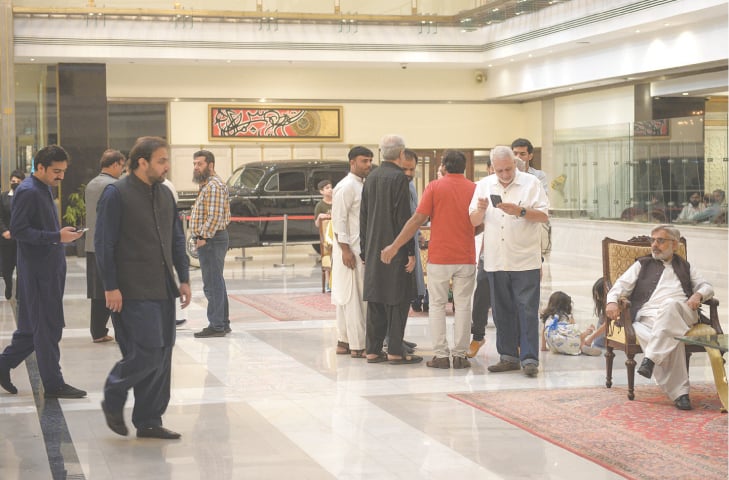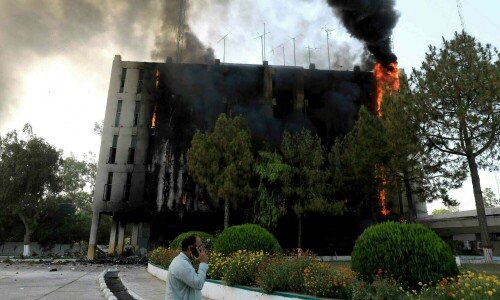
AT a recent presser, Interior Minister Rana Sanaullah had some ominous words for the opposition in Punjab: “We will not let Elahi become the chief minister so easily. If five to seven PTI lawmakers do not show up on Friday, how will the party have its chief minister?”
This warning paved the way for a trans-party strategy for the Punjab chief minister’s election, being held today in Lahore, and a sense of déjà vu has pervaded the political process ever since. The PML-Q, which is steering the campaign for the opposition alliance as its senior leader Chaudhry Parvez Elahi is a nominee for the highest office of the province, has also dusted off this time-tested formula of lodging lawmakers in one place, keeping them under watch and ensuring loyalty through ‘detention’.
Both the treasury and opposition have separately lodged their loyalists in three five-star hotels in the provincial capital, where the media has free access and both sides are boasting required numbers ahead of the poll.
“What else can be done to secure our members from the greed of massive money that circulates during these elections or the unrelenting pressure from the agencies,” wonders PML-Q Senator Kamil Ali Agha.
He, however, claims the party has made arrangements only for the stay of newly minted MPAs because they did not have official residences in the city yet. “Our party is on the record protesting against the Intelligence Bureau’s ‘track and trace’ operation against our MPAs. How else to deal with the situation if not by insulating our members through a collective effort? Though keeping them at one place is more of a psychological consolation and has limited practical utility. If someone wants to switch sides, there is hardly any effective way to stop him/her. But, it does rob them of lame excuses to avoid following the party line,” Mr Agha adds.
This strategy of housing parliamentarians at one place, to be produced at an opportune time, has been in vogue since the late ’80s, when then-Punjab chief minister Nawaz Sharif huddled his MPAs at a forest resort in central Punjab — Changa Manga — and introduced a new tactic for warding off political challenge.
Since then, it has become a fundamental rule for politicians to fight for (political) survival; recently, the PPP employed this approach when it lodged PTI dissident members of the National Assembly at Sindh House, Islamabad in March this year ahead of the no-confidence motion against the then premier Imran Khan.
A month later, the PML-N transported all provincial lawmakers supporting incumbent CM Hamza Shehbaz, including 25 PTI dissidents, to a Lahore hotel. As the PTI mounted protests outside the hotel concerned in Gulberg, they were safely shifted to the more secure Cantonment areas and produced in the Punjab Assembly on April 30 to elect Hamza as the chief minister.
The PTI, especially its chairman Imran Khan, has long been an ardent critic of this “anti-democracy, feudal and corrupt practice”, but has now become the latest entrant to the club practicing this cardinal approach.
The PML-Q and its leadership — the much-venerated Chaudhry Shujaat Hussain and Punjab Assembly Speaker Chaudhry Parvez Elahi — that has been synonymous with ‘decency and trusting people’, and took pride in it too, also fell for it.
Both opposition parties have moved their members to a local hotel as insurance against any, what they call, “sale-purchase”.
Though every party has preferred this line of action when chips are down, but it also has its critics among politicians, who deem it insulting for lawmakers as a “class” and only paints them as “undependable, open to auction”.
“It is pure moral degradation of society,” regrets Mohsin Leghari, a former PTI provincial minister.
One can hardly defend any aspect of this sordid exercise. Each time, it has happened under full media glare, successive governments have known about it, all parties have criticised it, yet practiced it repeatedly: look at the PML-N, which invented this approach, refined the tactics and regularly practiced it, Mr Leghari maintains.
A PML-N leader, who did not want to be named for the sensitivity of the matter for his party, says one needs to consider why this strategy was invented and practiced. “Only because the ‘invisible forces’, as party supremo Nawaz Sharif calls them, have regularly rigged the process: scared or lured lawmakers into defection, made and broken political parties at will. It was, in fact, a practical response to a particular situation, not a moral issue. Since it worked, even those who have been criticising it are now utilizing it. It’s realpolitik, and should be considered as such, not judged on moral grounds,” the ruling party leader said.
Published in Dawn, July 22nd, 2022















































